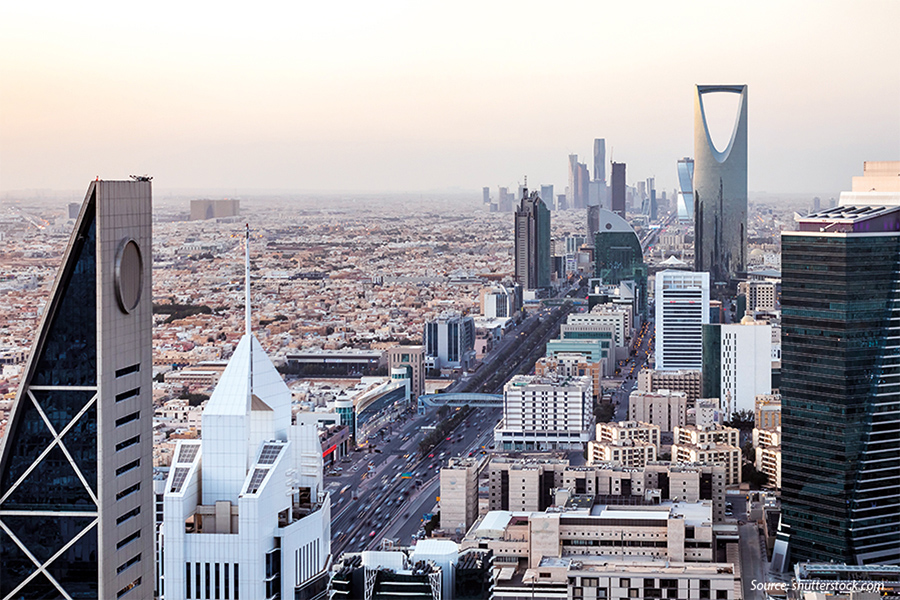
KSA skyline
The Kingdom of Saudi Arabia (KSA) has announced policy reforms to weather the COVID-19 storm. From increasing VAT to accelerating digital transformation agenda.
The Kingdom has also announced guidelines around the phased reopening of businesses. Shopping malls, retail stores and F&B outlets have been allowed to operate abiding by the strict guidelines around sanitisation, social distancing and staying within the minimum capacity. Entertainment centres, fitness centres, beauty salons, however, remain closed for the time being.
In fact, as the daily COVID-19 cases increased in Saudi Arabia, the government has re-imposed curfew in Jeddah for two weeks, starting June 6. Retail businesses, restaurants and cafés are not allowed to operate during the movement restriction, while employees in both the private and public sectors have been mandated to work from home.
Under the current circumstances, amidst social distancing measures, like several other countries around the world, KSA has also recorded an increase in online retail transactions, especially during the lockdown. “This is something we have seen across the region and the world as countries have gone into lockdown and implemented stay-at-home measures in order to curb the spread of COVID-19,” agrees Billy FitzHerbert, regional editor – Middle East for Oxford Business Group (OBG).
“The shift towards online should be welcomed with e-commerce as a segment set to gain significant market share as a result of the crisis. The pandemic has forced consumers to shift their consumption patterns and engage with online channels, and this shift will be a significant legacy for the retail sector in the years ahead,” he adds.
Staying with digitalisation, KSA’s digital transformation agenda for retail, in light of the current crisis might get accelerated.
“One of the central digital strategies of Saudi Arabia’s Vision 2030 is to boost the number of cashless transactions to 70% by 2030. This is a huge target but very achievable given the Kingdom’s young, tech-savvy population. The current crisis has already served to accelerate the shift to online retail, but it has also spurred digitisation across many other sectors. Banks are now encouraging customers to stay away from branches and use digital channels. Educational institutions have moved their classes online. Health clinics have started taking consultations remotely. History shows that once effective new technologies are taken up by consumers in society, there is very little incentive to relinquish them. One of the lasting legacies of this pandemic will be a major shift towards digital channels across many sectors of the economy, not just retail,” FitzHerbert observes.
Several GCC countries, including Saudi Arabia, have been focused on reducing dependence on oil-based revenues. In this context, the Kingdom has been undertaking several measures to increase revenues from sectors like retail, among others. However, the COVID-19 has posed several challenges to the Kingdom’s economy – like anywhere else in the world.
Will this cause a downward revision of domestic growth forecasts for 2020?
The International Monetary Fund (IMF) predicts that the global economy will contract by 3% as a result of the COVID-19 pandemic, much worse than the downturn caused by the 2008 crisis, OBG indicates.
“Saudi Arabia has had to contend with the twin challenges of the economic lockdown as well as the fall in oil prices driven in part by the massive fall-off in global demand for energy. Hence, a downward revision could be expected. However, the global economy is expected to rebound strongly in 2021, by approximately 5.1% and we expect Saudi Arabia’s expansion will track this,” states FitzHerbert.
One of the most recent policy changes in Saudi Arabia is the increase in value-added tax (VAT), which is now 15% up from 5%. The big question is its impact on retail.
“What we saw when a 5% VAT was implemented in Saudi Arabia was that although at first it caused a slight drop off in demand, it was quickly adjusted as people factored the new costs into their daily living expenses,” FitzHerbert recounts. “We can expect to see a similar process take place with this recent hike. The fact that it comes at a time when public purse strings are strained will mean such a move will be welcomed by the local and international business community as it demonstrates further commitment to moving the Saudi economy onto a more sustainable footing and away from an over-reliance on hydrocarbons.”
For all the latest retail news from the Middle East, follow us on Twitter and LinkedIn, like us on Facebook and subscribe to our YouTube page.
Notifications